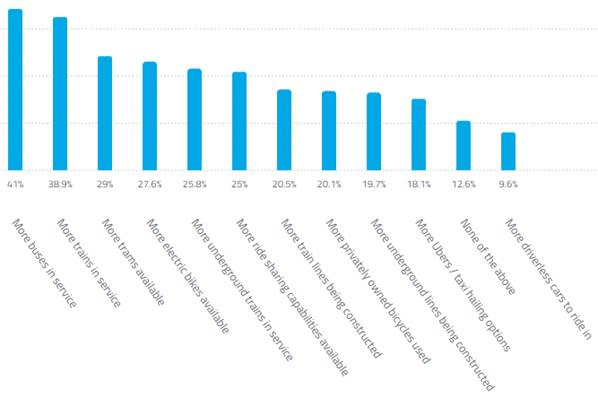
Key findings:
- 51% of UK consumers are in favour of granting Uber a further licence extension
- Improved mobility for older people (20%), greener cities (12%) and lower congestion (14%) are all associated benefits
- Just 7% are aware of Uber’s electronic bike share service, JUMP — this is likely to change as the bike service expands
- Just one in ten consumers see the development of driverless cars as a necessary step in the improvement of transport in major cities
Commissioned among 2,059 consumers in the UK, the study found improved mobility for older people (20%), greener cities (12%) and lower congestion (14%) are all associated benefits of Uber. This reflects the business’s focus on becoming a ‘fit and proper’ private car hire operator – supported by 23% of consumers thinking Uber is more socially responsible than two years ago.
In fact, 30% feel Uber should be granted either a long term licence (3+ years) or a permanent licence to operate in the capital.
Katie Gilsenan, Senior Trends Analyst at GlobalWebIndex comments: “Uber has introduced several new initiatives in London to alleviate regulator concerns, including 24/7 telephone support and the ability to share journeys with friends and family. However, some of the most impressive developments we’ve seen by the company have resulted in entirely new products and services geared towards a more sustainable and more mobilised future.”
Raising awareness
49% of consumers now state Uber is available as a taxi service in their area, putting the global technology company in contention across the country with local independent services, which 71% of consumers have access to.
While nearly half (49%) of consumers are also aware of the arrival of food delivery service, Uber Eats, just 7% express awareness of the diversification of Uber through the launch of electronic bike share service, JUMP.
In a separate H1 2019 study amongst 2,310 Uber users in the UK, it identified that 47% are interested in environmental issues.
Additionally, 53% of UK Uber users say they would pay more for sustainable products, so driving awareness for these new, more environmentally friendly initiatives by Uber will be important in meeting consumer expectations. 21% of consumers express they’d like to see more electric cars from ride-hailing businesses like Uber and 8% would like to see more electric bikes for hire.
The future
Exploring how major cities can improve transport in the future, 39% of respondents stated more trains were needed and 41% cited more buses, highlighting a widespread feeling that as we head into the future, the current level of public transport is not enough.
When asked why UK Uber users turn to Uber over public transport, the study found that it’s more convenient (53%), public transport does not run late/early enough (32%) and public transport is too crowded (32%).
Interestingly, just one in ten consumers currently see the development of driverless cars as a necessary step in the improvement of transport in major cities, but already nearly a quarter (23%) are in favour of Uber developing driverless cars.
Katie continues: “It’s clear that UK consumers have a clear preference in favour of Uber and its services. There’s real interest in progressing the way in which we get around in the future, making it more environmentally friendly, smarter, and generally more convenient for all. From the research, it’s apparent people see Uber as a key player in achieving several of these ambitions.”
UK consumer perceptions on how major cities can improve transport for the future:
Methodology:
- Research conducted amongst 2,059 respondents in the UK, September 2019.
- Separate survey conducted amongst 2,310 UK Uber users in Q1/Q2 2019
